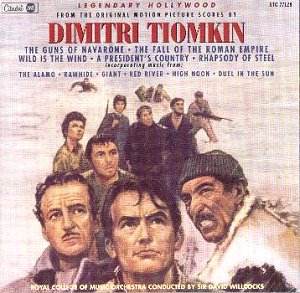Dimitri TIOMKIN The
Guns of Navarone. The Fall of the Roman Empire. A President's Country. Rhapsody
of Steel. Wild is the
Wind  The Royal
College of Music Orchestra conducted by Sir David Willcocks (David King -
organ)
The Royal
College of Music Orchestra conducted by Sir David Willcocks (David King -
organ)  CITADEL
STC77128 [56:56]
CITADEL
STC77128 [56:56]

The first thing to realise is that this is a re-release of
the 1985 Unicorn-Kanchana album - `The Film Music of Dimitri Tiomkin' DKP(CD)
9047. Despite the stunning sound and the doubtless enthusiasm of a student
RCM orchestra, the essential Tiomkin idiom too often escapes them. How much
this is due to the bizarre choice of conductor David Willcocks, more at home
in Kings College Chapel, Cambridge or conducting choirs in Bach and Handel
etc one cannot say. Like the curate's egg this album is good in parts. My
hunch is that Christopher Palmer who arranged and orchestrated Rhapsody
of Steel persuaded Unicorn-Kanchana to record this album (and the `Western
Film Music of Dimitri Tiomkin' much better performed by Laurie Johnson and
The London Studio Symphony Orchestra) when he was producing the wonderful
series of Delius recordings with Eric Fenby? Possibly it was thought that
the RCM orchestra would provide an economic solution and Willcocks may well
have viewed the project as good publicity and good exercise for the RCM
students?
The positive side first. The inclusion of the music for the
documentary, Rhapsody of Steel is a real bonus. This score has all
the hallmarks of Tiomkin's dynamic music, with an abundance of excitement,
and wit and glitter, and vivid evocation. The film and score cover the history
of the development of steel stretching from the Iron Age through the discovery
of steel in India and its appropriation by the sword-makers of Damascus to
the birth of the steel age in the 19th century with all its consequent
dramatic power. The second part of the composition follows the multifarious
uses of steel in a busy urban community. The music is a playful set of variations
on `I Feel Wonderful'. As Palmer says, "a big jazzy chrominum-plated climax
builds in which all the sights and sounds of the metropolis seem to converge
(taxi horns among them). Its eupeptic spirit is similar to that of the rowdier
parts of An American inParis - `A Russian in New York'? The concluding
fugato has a heroic lyricism as we look outwards to the use of steel in space
exploration.
A President's Country was a score for another documentary score
designed to show off the south west of Texas, homeland of President Johnson.
The score was a compendium of themes and songs from Tiomkin's great western
scores: Red River, Duel in the Sun, Giant, Rawhide, High Noon,
and The Alamo. The RCM deliver a vibrant reading with their tongue
firmly in their cheeks and they really relish the wayward arrangement of
the Rawhide theme.
Christopher Palmer's `Pop ballad' arrangement of Wild
is the Wind (made famous as a single by Johnny Mathis) is a good
example of Tiomkin's romantic lyricism -- at best, probably, in Friendly
Persuasion. This performance is rather heavy-handed.
The 10½-minute suite from The Guns of
Navarone begins well with the evocative Prologue underscoring views
of the Greek islands and James Robertson Justice's narration. But when the
tempo picks up after initial martial strains, and the famous big theme emerges
the tempo suddenly drops back again too much and the excitement sags. Listen
to Charles Gerhardt on the rival RCA recording to hear how exciting this
music can really sound.
The same applies to the Overture of The Fall of the Roman
Empire. The urgency and grandeur that is heard on the soundtrack
is missing. Granted the sound is impressive but much more bite is necessary.
`Pax Romana' the splendid ceremonial music underscoring the extended scene
in which tribute is made to Emperor Marcus Aurelius (Alec Guiness) from
representatives of his far-flung empire fares better.
An album of highs and lows, but one that should be in every
Tiomkin-lover's collection.
Reviewer
Ian Lace
